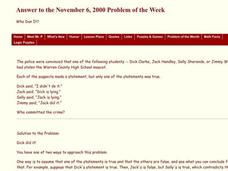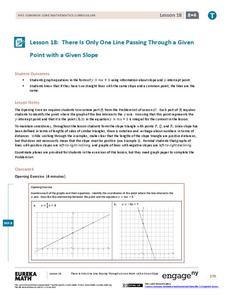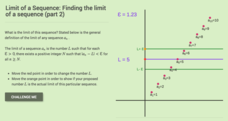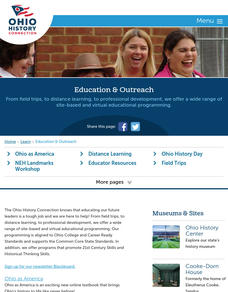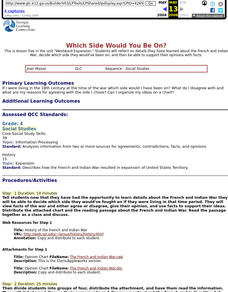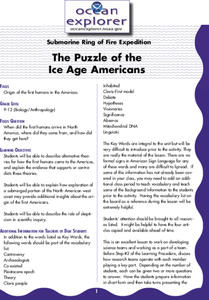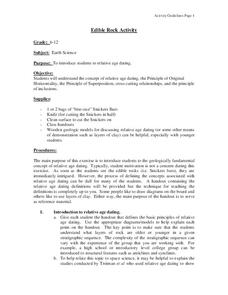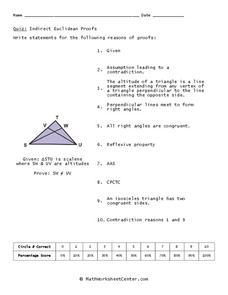Curated OER
100 Great English Oxymorons - Phrases That Contradict Themselves!
In this oxymoron instructional activity, learners test their vocabulary skills by reading and identifying the contradiction in each of the given phrases.
Center for History Education
Freedom for All? The Contradictions of Slavery and Freedom in the Maryland Constitution
Freedom for the few! An interesting instructional activity focuses on the Maryland Constitution and its lack of freedom for African Americans. Scholars examine the premise of freedom for all—which only extended to a limited few. ...
Curated OER
Who Dun It?
In this proofs by contradiction activity, students solve 1 word problem about a crime. Students use proof by contradiction to determine the criminal in the word problem.
Curated OER
Errors vs. Rhetorical Devices
Is there a difference between writing errors and employing rhetorical devices? This presentation argues that there is a difference, but it might be a finer point than one would think. Addressing double entendre, oxymorons, and parody,...
Curated OER
The Early American Contradiction
Students use the Constitution and Declaration of Independence to investigate the apparent contradictions between slavery and freedom. The activity looks at the reasons for the incorporation of slavery into early colonial life even with...
EngageNY
The Converse of the Pythagorean Theorem
Is it a right triangle or not? Introduce scholars to the converse of the Pythagorean Theorem with a lesson that also provides a proof by contradiction of the converse. Pupils use the converse to determine whether triangles with given...
EngageNY
There is Only One Line Passing Through a Given Point with a Given Slope
Prove that an equation in slope-intercept form names only one line. At the beginning, the teacher leads the class through a proof that there is only one line passing through a given point with a given slope using contradiction. The 19th...
CK-12 Foundation
Limit of a Sequence: Finding the Limit of a Sequence (Part 2)
What does it mean if young mathematicians cannot put the squeeze on a sequence? Learners investigate a divergent sequence and find the formula for the nth term. Using the definition of a limit of a sequence, pupils try to find the limit...
Education Bureau of Hong Kong
Mental Models
Behaviors are often based on assumptions. That's the big idea in the third lesson of a series of critical think resources. Through a series of worksheets, learners examine the conscious and heretofore unconscious assumptions that...
Curated OER
Using Primary Source Documents
Students examine copies of primary source documents and determine the document's value to a researcher. They analyze and evaluate the document for bias or contradiction. They know the difference between a primary and secondary source.
Curated OER
Taking Up Arms and the Challenge of Slavery in the Revolutionary Era
Students examine a series of documents which discuss the contradiction in the Americans' rhetoric about slavery. They act as members of designated Committees of Correspondence in the five different colonies, communicating their...
Curated OER
Which Side Would You Be On?
Fourth graders describe how the French and Indian War resulted in expansion of United States Territory and analyze information from two or more sources for agreements, contradictions, facts, and opinions.
Curated OER
Freedom for All? The Contradictions of Slavery and Freedom in the Maryland
Pupils are be able to analyze the contrast between the rights and privileges referenced in the Declaration of Independence and the Maryland State Constitution in comparison to the rights and privileges of slaves. They are be able to...
Beauty and Joy of Computing
Unsolvable and Undecidable Problems
Try as you might, some functions just cannot be computed. The lab introduces the class to the possibility of unsolvable problems. The fourth lesson in a series of seven begins with a logic problem, then progresses to looking at functions...
Curated OER
African Amercan Images in Harlem (1920-1950)
Eleventh graders compare and contrast different representations of African Americans in Harlem using visual sources. They detect point of views, themes, contradictions and ironies in sources using designed templates.
Maryland Department of Education
The Concept of Diversity in World Literature Lesson 4: Proverbs
"Eneke the bird says since men have learnt to shoot without missing, he has learnt to fly without perching." As part of their study of Things Fall Apart, class members read Paul Hernadi and Francis Steen's essay, "The Tropical Landscapes...
EngageNY
Numbers Raised to the Zeroth Power
What in the world is the zeroth power? Examine the patterns of exponents as they apply to the zeroth power. Scholars apply the zero property to simple exponential expressions in this fourth activity in a series of 15. The examples...
EngageNY
Our Group Readers Theater: Managing the Sequence of Events in Our Script
Go with the flow. Scholars learn how using transition words and phrases helps their scripts flow smoothly. Readers think about connecting each section after determining the sequence for their readers' theater manuscripts from To Kill A...
Curated OER
The Puzzle of the Ice Age Americans
Pupils describe alternative theories for how the first humans came to the Americas, and explain evidence that supports or contradicts these theories. They examine the role of skepticism in scientific inquiries.
Curated OER
Writing Business Letters of Request
Tenth graders model proper format and elements of business letters. They review effective writing styles and write a request letter. Students also read a short story that includes conflict irony and symbolism They create a chart...
Curated OER
Learning to Master: Some Ideas from Tradition
Students explore the Biblical teachings. In this stewardship lesson plan, students cite passages from the Bible that promote philanthropy and identify Biblical texts that contradict one another.
Curated OER
Edible Rock Activity
Who knew Snickers® could be used to teach science? Give your budding earth scientists a chance to explore the Law of Superposition, in addition to a well-earned snack.
Curated OER
Indirect Euclidean Proofs
In this Euclidean proofs worksheet, 10th graders solve 10 different problems that include completing indirect Euclidean proofs. First, they write a statement for each of the reasons listed on the sheet of proofs. Then, students solve the...
Curated OER
Three for the Money: The Degree/Diameter Problem
Young scholars explore the concept of vertex-edge graphs. In this vertex-edge graphs lesson, students try to construct a graph with a given diameter, number of vertices, size, and planarity. Young scholars construct various vertex-edge...
Other popular searches
- Proof by Contradiction
- Proofs by Contradiction
- Contradiction and Math
- Contradiction Proofs
- Surd Proof by Contradiction
- Proofs of Contradiction
- Geometry by Contradiction
- Contradiction Lesson Plans
- Math Proofs by Contradiction




